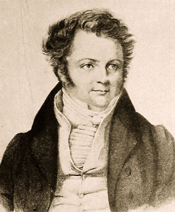
19 Nov 2006
MARSCHNER: Der Vampyr
Der Vampyr, romantic opera in two acts in the version by Hans Pfitzner (1924).
Mozart and Salieri, an opera in one act consisting of two scenes.
Nicolai Rimsky-Korsakov (1844-1908), composer. Libretto derived from Alexander Puskhin's play of the same name.
First performance: 7 December 1898 in Moscow.
Ariadne auf Naxos, Oper with a prologue and one act. Music composed by Richard Strauss. Libretto by Hugo von Hofmannsthal.
La Vestale, a tragédie lyrique in three acts.
Boris Godunov, an opera in four acts with prologue
Modest Mussorgsky, composer. Libretto by the composer, based on Alexander Pushkin's drama Boris Godunov and Nikolai Karamazin's History of the Russian Empire
First performance: 8 February 1874 at the Mariinsky Theatre, St. Petersburg
Il Trovatore, dramma in four parts.
Only a few months following the premiere of Der Rosenkavalier, Hugo von Hofmannsthal proposed a new opera to Richard Strauss based on Molière’s comedy-ballet, Le Bourgeois gentilhomme (in German, Der Bürger als Edelmann).
Die Entführung aus dem Serail, Singspiel in 3 Acts.
Music composed by Wolfgang Amadeus Mozart (1756–1791). Libretto by Johann Gottlieb Stephanie the Younger, based on an earlier libretto by
Christoph Friedrich Bretzner.
Die Entführung aus dem Serail, Singspiel in 3 Acts.
Music composed by Wolfgang Amadeus Mozart (1756–1791). Libretto by Johann Gottlieb Stephanie the Younger, based on an earlier libretto by
Christoph Friedrich Bretzner.
Arabella: Lyrische Komödie in three acts
Die Entführung aus dem Serail, Singspiel in 3 Acts.
Music composed by Wolfgang Amadeus Mozart (1756–1791). Libretto by Johann Gottlieb Stephanie the Younger, based on an earlier libretto by
Christoph Friedrich Bretzner.
La Gioconda, dramma lirico in four acts.
Music composed by Amilcare Ponchielli (1834–1886). Libretto by Arrigo Boito (under the pseudonym Tobia Gorrio), based upon Victor Hugo's Angelo, Tyrant of Padua (1835).
Don Carlo, an opera in four acts. Music composed by Giuseppe Verdi (1813–1901). Libretto by Joseph Méry and Camille Du Locle after Friedrich von Schiller’s dramatic poem Don Carlos, Infant von Spanien. Revised version in four acts (French text revised by Du Locle, Italian translation by Achille de Lauzières and Angelo Zanardini).
Un ballo in maschera, a melodramma in three acts.
Music composed by Giuseppe Verdi. Libretto by Antonio Somma, based upon the work of Eugène Scribe Gustave III ou Le bal masqué (1833)
Medea: Melodramma tragico in three acts.
Die Tote Stadt, an opera in three acts.
Music composed by Erich Wolfgang Korngold (1897-1957). Libretto by Paul Schott (Julius and E. W. Korngold) after the novel Bruges la morte by Georges Rodenbach.
Some Details concerning the Revolution inaugurated by Rossini
Manon Lescaut, dramma lirico in quattro atti
Elektra: Tragedy in one act.
Lyric Opera of Chicago has announced both schedules and cast-lists for is Spring 2020 performances of Richard Wagner’s Ring Cycle. Given the series of individual productions already staged by the company since Fall 2016, that pave the way for the complete cycle, Lyric Opera of Chicago’s complete production should affirm the artistic might of the great composer.
“Diacono himself does not know what musical talent he possesses” – Mascagni

Der Vampyr, romantic opera in two acts in the version by Hans Pfitzner (1924).
Streaming Audio
Music composed by Heinrich August Marschner (1795-1861). Libretto by Wilhelm August Wohlbrück after the play Der Vampir oder die Totenbraut by Heinrich Ludwig Ritter.
First Performance: 29 March 1828, Theater der Stadt Leipzig, Leipzig
| Principal Characters: | |
| Lord Ruthven, the vampire | Baritone |
| Sir John Berkley | Bass |
| Janthe, his daughter | Soprano |
| Sir Humphrey Davenaut | Bass |
| Malwina, his daughter | Soprano |
| Edgar Aubry, employee of Davenaut's | Tenor |
| The Vampire Master | Spoken role |
| John Perth, Lord Ruthven's steward | Spoken role |
| Emmy, his daughter and Dibdin's fiancee | Soprano |
| George Dibdin, servant of Davenaut's | Tenor |
| Berkley's manservant | Bass |
| James Gadshil | Tenor |
| Richard Scrop | Tenor |
| Robert Green | Bass |
| Toms Blunt | Bass |
| Suse Blunt, Toms's wife | Mezzo-Soprano |
Setting: Sir Humphrey Davenaut's Estate in Scotland, 18th century
Synopsis:
The vampire Lord Ruthven appeals to his Vampire Master to grant him another year of life on earth before being condemned to hell. The Vampire Master agrees provided Ruthven can bring three more victims to him before midnight. Almost instantly, Janthe, daughter of Lord Berkley, falls into Ruthven's clutches and is despatched in the vampires' cave. Her father's rescue party comes belatedly onto the scene and Ruthven is accused of her murder. He is stabbed and left for dead. Aubry, a member of the house of Davenant, comes upon Ruthven's near-lifeless body, however, and helps him recover in the moonlight. Horrified at realising that Ruthven is a vampire, Aubry is nevertheless sworn to secrecy because Ruthven had once saved his life. At a wedding party among the local peasantry shortly afterwards, Ruthven sets his sights on the bride, Emma, lures her away and murders her. Finally, Malwina Davenant prepares to marry Ruthven himself according to her father's wishes (she would prefer Aubry), but Aubry reveals the vampire's true nature and Ruthven is straightaway dragged down to hell by a demonic crew. Davenant awards Malwina's hand to Aubry.
[Synopsis Source: Boosey & Hawkes]
Click here for the complete libretto (original 4-act version)